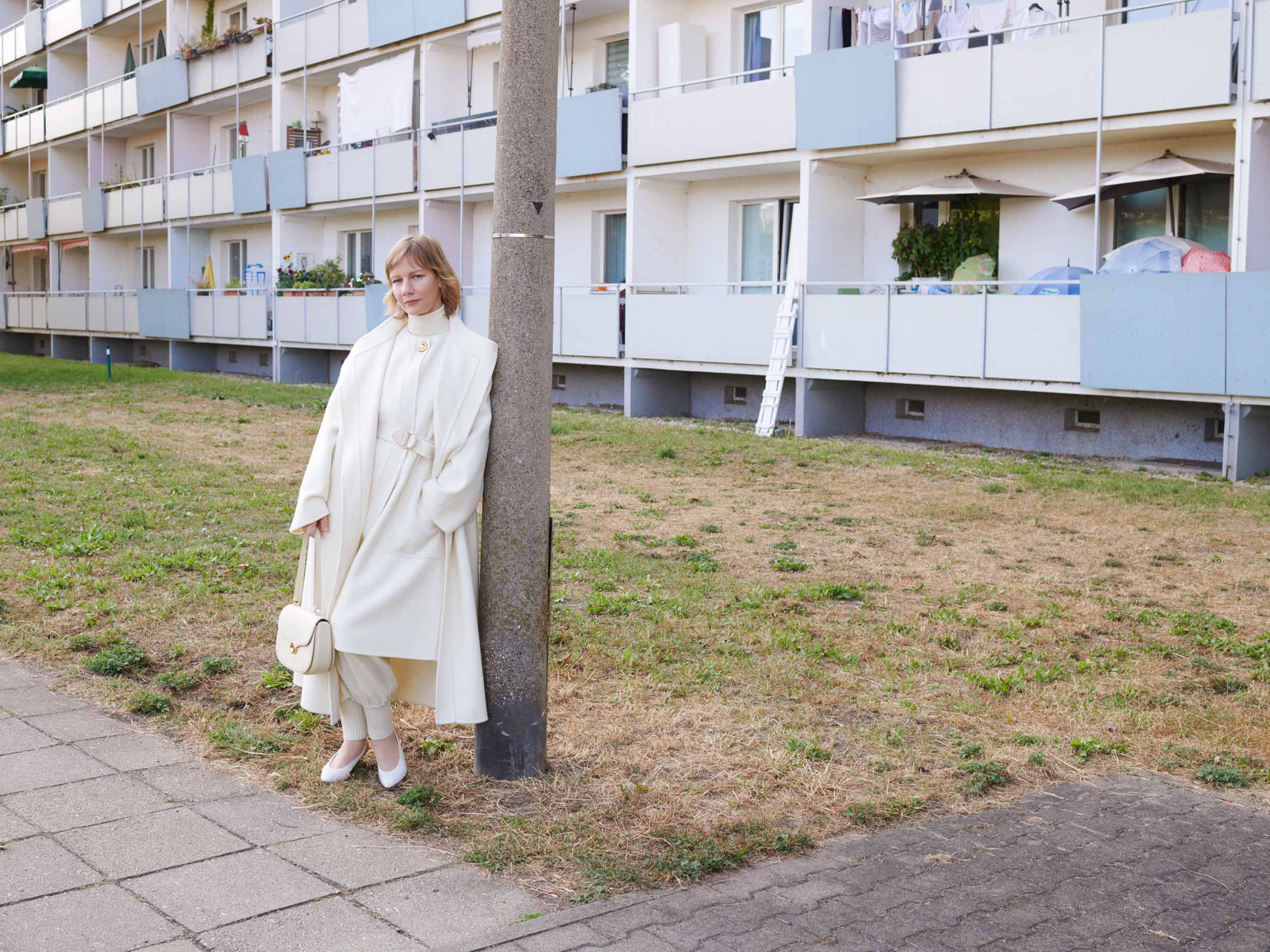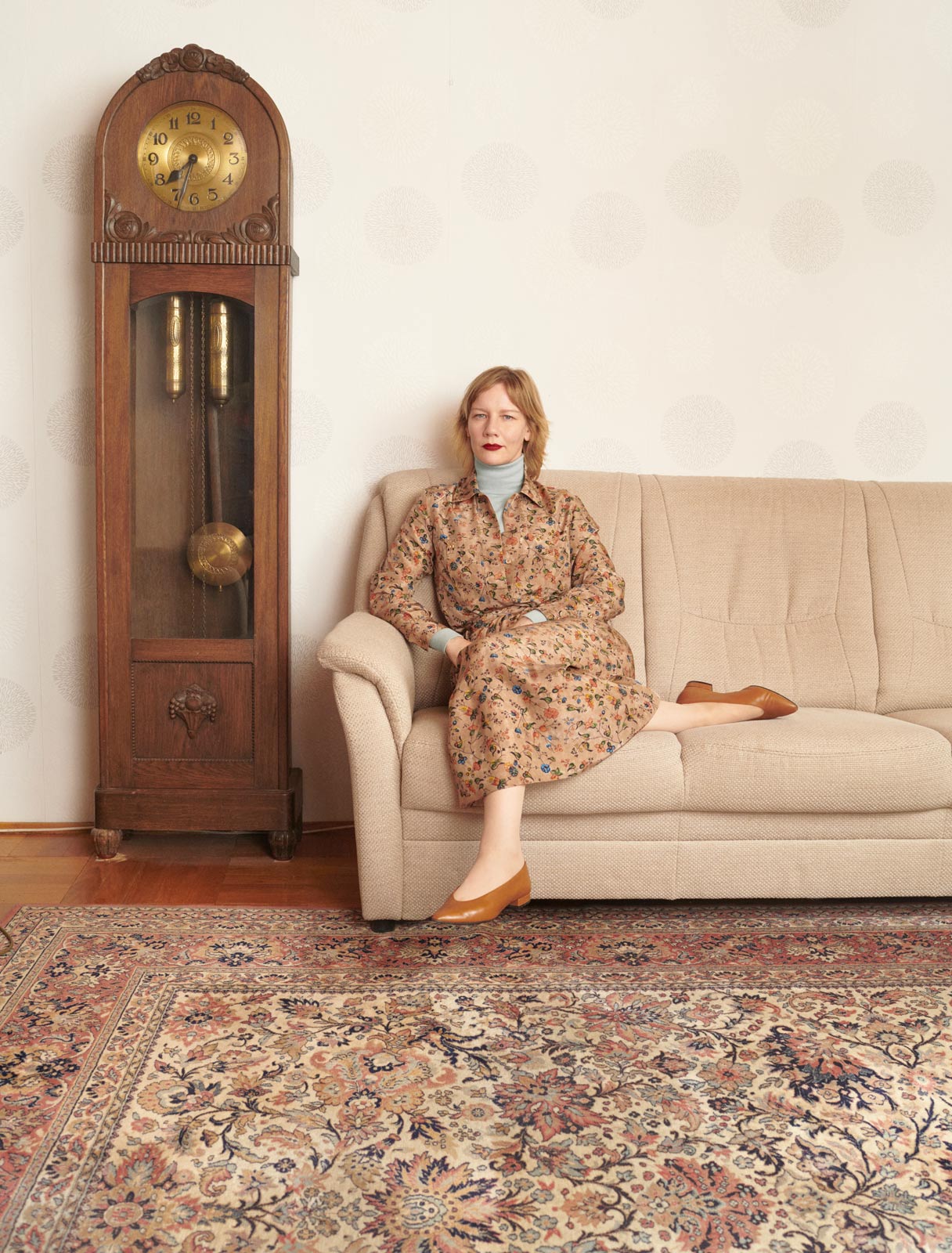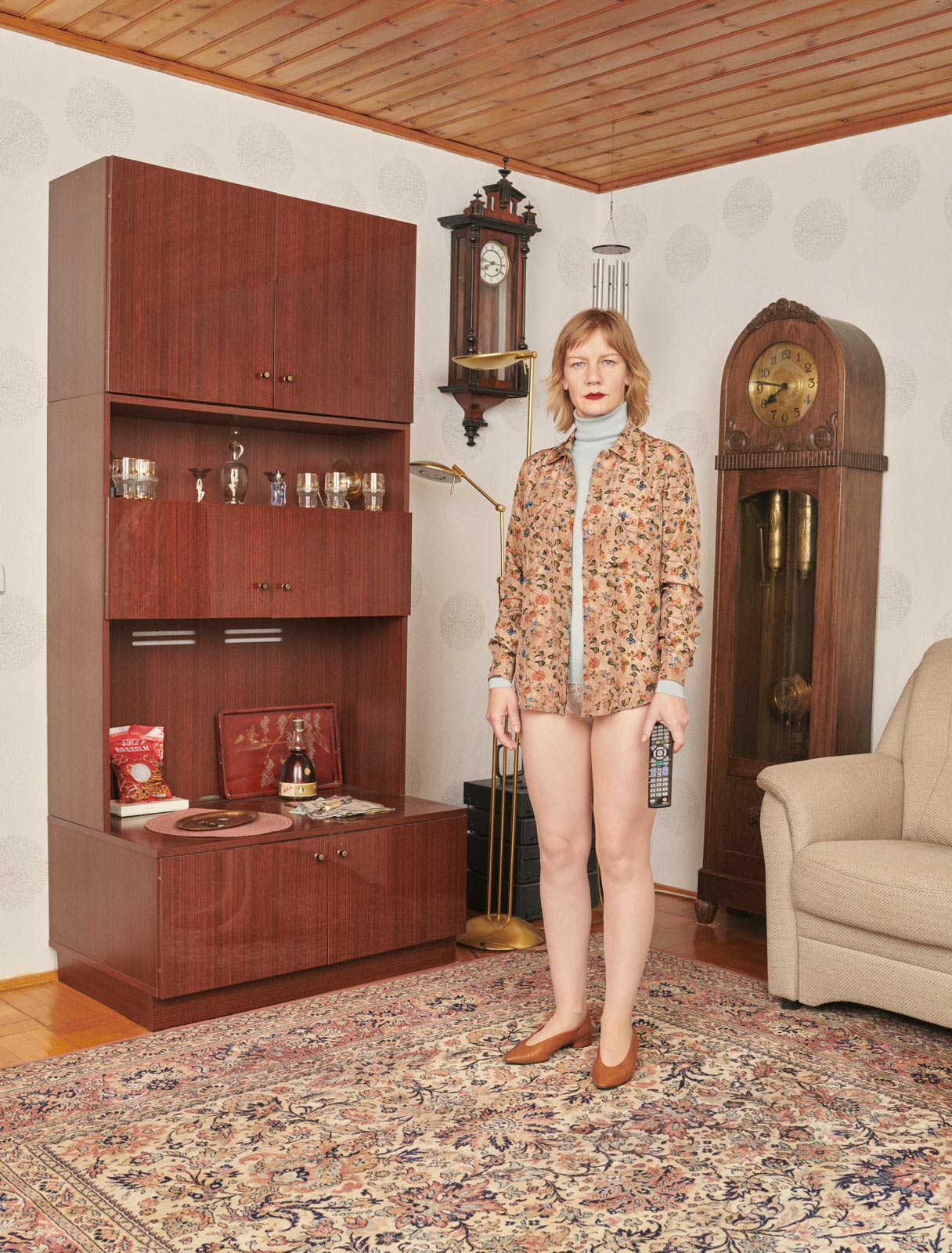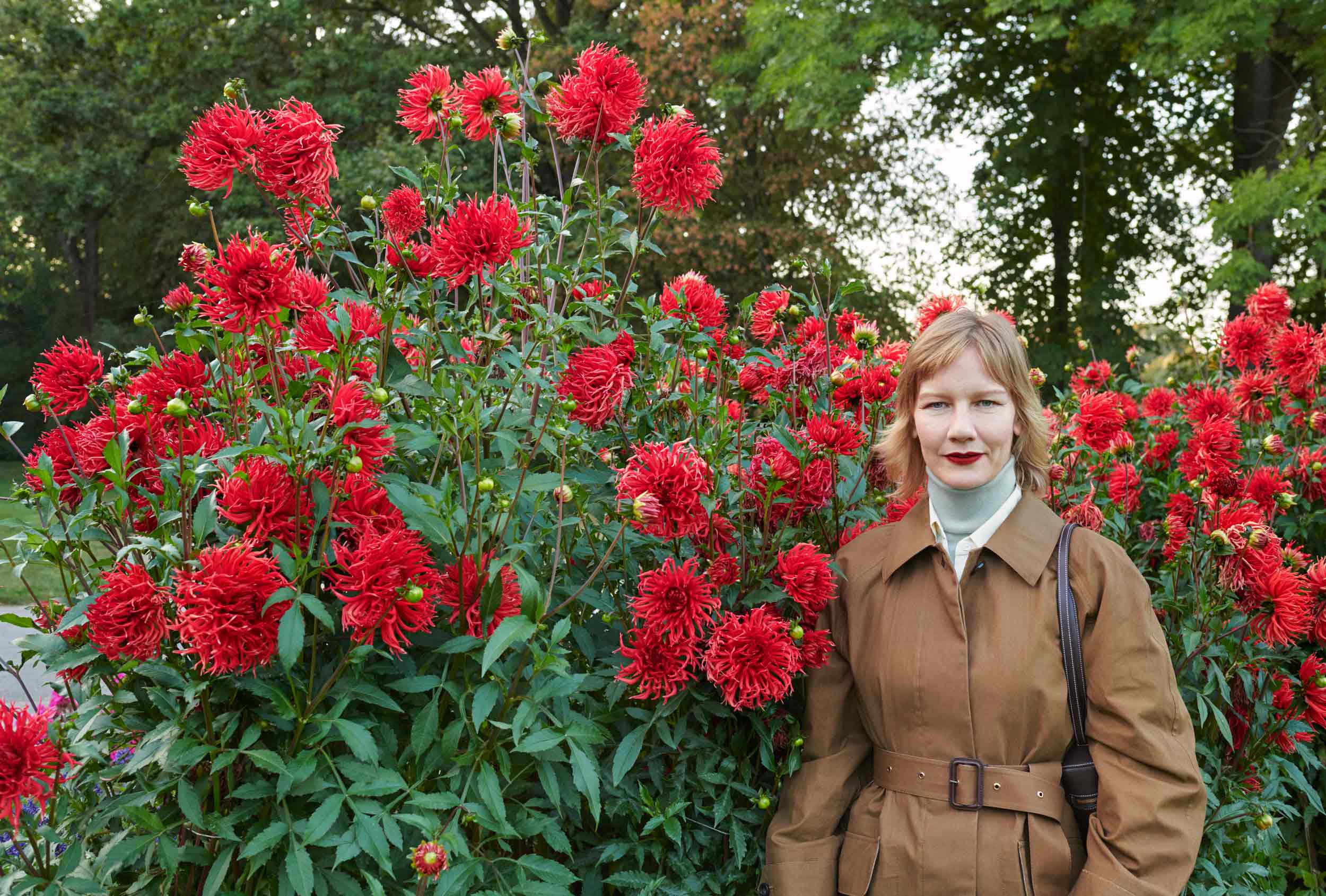For Document’s Fall/Winter 2023 issue, the actor and filmmaker meet to unpack the art of anti-storytelling
On-screen, a husband and wife are talking across a kitchen table, piercing through the failures of their marriage, pouring fast glasses of white wine. In this moment, time loosens all of its stops. Desire bubbles on a low simmer. You peer into the eyes of someone who has admitted something awful, and suddenly you are witness to the fact of their emotional center—their errors, their sadness, their confusion. Instead of edges, you watch a sea of entanglements wash over their face; they’re wearing all the things they struggle to resolve. There is no need for an answer—observation is enough. The fraughtness is all-too-palpable. It’s an anti-finish line.
Down the splinter of all this human injury stands actor Sandra Hüller—a player in the 2023 Palme d’Or-winning Anatomy of a Fall and Jonathan Glazer’s latest, The Zone of Interest. With her acting chops forged in the theater, Hüller dissects her parts with a fluency and cognizance that make you believe—never providing an instruction manual, but rather constructing each scene as if it were a Renaissance painting. The harder you look, the shorter the distances between hidden and revealed, enigma and fact, closed and open. In these most recent offerings, Hüller is at her peak power. The two films led her to play contrasting figures. In Anatomy of a Fall, she is a complicated writer whose fate is to be determined by her ability to present her internal affairs as believable before a court. In The Zone of Interest, she portrays a stern and dissociated Nazi housewife—all too unheeding of the smokestacks and gunshots that ricochet behind her “perfect” garden. From witnessing these spectacles, a question is posed to the audience: “How do we make room for aliveness in the midst of dramatic circumstances?”
Norwegian director Joachim Trier is no stranger to this form. Best-known for his Academy-nominated film The Worst Person in the World—the third part of his Oslo Trilogy—Trier’s work makes room for the unexpected, for transformation, for making sense of the “destructible possibilities of being human.” His films function as psychographic meditations on behavior, desire, and—as Hüller puts it—“sitting with the questions.” Instead of just exposing the audience to a plotline, Trier’s work navigates the story through character.
Both creators take part in portraying the aliveness of the everyday, asking questions viewers may very well chew on for weeks on end. Here, Hüller and Trier discuss anti-storytelling and the importance of giving film the chance to change you.
Joachim Trier: In Requiem, you play a young woman experiencing the sublimity of falling in love for the first time. There’s a moment that I watched again and again: You go to the dance floor, and [there’s this] emotionality in your face—there’s crying, there’s joy. There’s this transcendental sense of freedom in her, but also in you as an actor. I can’t reduce it to saying, ‘I know exactly what she feels.’ [But] your mystery becomes my mystery. Your explosion of emotion transfers to me. It’s a rare thing. Do you remember doing that scene?
Sandra Hüller: Of course I remember—it was literally my first work on film. It felt very intimate, [as if I was] alone. [That’s] a genuine human desire: to be free. Sometimes we feel it, and sometimes we don’t. Sometimes it’s connected to responsibility. Sometimes it’s connected to hurting other people, and taking freedom away from another person to have your own. She realizes, at that moment, what it means to be free. At the same time, she probably sensed the impossibility of being free all the time. There’s gratefulness and pain and beauty in it.
Joachim: Yesterday, I watched The Zone of Interest, and I was devastated by it—completely. It’s deeply profound and thought-provoking. Without trying to [sound] smarter than I am, you end up thinking about [Theodor] Adorno, about Hannah Arendt, about yourself, about your children, about the mechanics of the destructible possibilities of being human. There are so many layers—and in the middle of that, you give a human face to inhumanity. You could so easily have created sympathy, which would have been morally complicated. You have to stay on a very narrow line of not going into the grotesquerie or asking for sympathy, but staying true to every moment as that character.
Sandra: There were 10 cameras in almost every scene. Some were hidden and some were visible to us, but we could ignore them because we never knew what they were filming. [Jonathan Glazer] really wanted us to be in that house.
“Your mystery becomes my mystery. Your explosion of emotion transfers to me.”
Joachim: You created a space of utterance for the unspeakable, and you tried to give it a form—which is both generous and provocative, because we have to accept that humans did this. This is a part of our history, of our enlightenment, of our culture. If you had not dared to make that human, then we wouldn’t have been threatened—art should [challenge us] to ask, Can I identify with this?
Sandra: I told Jonathan from the beginning that I would not try to empathize or psychologize this figure. And I didn’t want to, because who would like to portray such a person? We wanted to portray the mechanism of the thing and the choice that these people made—because it is, in fact, a choice to live that way. It’s not something that happens to you by coincidence—suddenly finding yourself in a beautiful garden next to Auschwitz. It’s something that you do. I had a kind of pleasure in making her do the things that show that she has responsibility, to make her the perpetrator.
Joachim: You’re great at bringing us into the soul of someone.
Sandra: Well, the strictness and coldness is something that feels familiar. [It’s] connecting with something that doesn’t have anything to do with your life, or with parts of your life that you don’t want to live. What would the body of somebody like that look like? There was a line that [wasn’t] filmed in the end, where Rudolf [Höss] said, ‘We will never make it. We will never finish this project.’ And that’s true—they didn’t win. They could only be big by making other people small; they could never be beautiful on their own.
Joachim: I understand why you didn’t want to psychologically try to understand her politics—that would be an impossible task. But [you tried] to do true movements, the actions of the everyday. [When she is] sleeping and the baby’s crying, you feel the dysfunctionality. I have a small child, and I cannot sleep if that child cries, but she sleeps because she’s used to the crying of people. I find that very powerful.
The film is also very smart in its insinuation of class—all the historical context. I think it’s a film that will live for a long time. I have a grandfather who was in the resistance and suffered tremendously during the war; I see the domino effects, the transference of emotion and trauma through culture. I think it’s also admirable for you, coming from Germany, to be a part of this. That’s a damn tough responsibility.
Sandra: I don’t feel like it’s something brave that I did, it’s necessary. I don’t want to have recognition for ‘daring’ to portray her. I don’t care. I can’t even tell you how much [it] means to me that I was allowed to be in that space, in those circumstances, with this story, with my nationality.
Joachim: As a team, you made a space for grief for many of us. I don’t make movies because I’m amazing at articulating. It’s something beyond that I want to reach: a strange mixture of anxiety, craft, and yearning that you don’t have complete control [over].
Sandra: [In] your films, it’s really the sitting with a question. It doesn’t need to be answered in the end. Looking at it closely is an act of love. It goes beyond the story or characters.
Joachim: I want to feel all the characters, to understand them. I’ve been privileged enough that most of the sadness or shortcomings I’ve experienced in life have [not] come from bad will. They’ve come from the tragedy of everyone doing their best. Finding meaning is hard. Finding love is hard. Being a family is complicated. I’m digging that hole at the moment. I’m inspired by art that wants to be sensitive and vulnerable.
If you take one moment out of someone’s life and look at it [from] a certain perspective, we’re all terrible. Everyone’s made mistakes. What I’m moved by [in Anatomy of a Fall] is seeing you trying to be truthful in that courtroom, the place where we are supposed to be more than we are, more perfect under the scrutiny of others—which you could say is an allegory to how society is moving with the private and public collapsing into each other. Your approach to that must have been very different.
Sandra: I’m not much of a preparer. I don’t like to do any background or biographical work—it bores me. I just like to work with the script. I like it when directors let me have my secrets. They don’t need to know where the emotions are coming from. Justine [Triet] would never insist on a character crying in the moment that is written in the script. Sometimes it comes at an unexpected moment, and it’s the right position for it. It’s good to understand that things happen when they must happen, not when we want them to happen.
Joachim: I love that. There’s a moment in The Worst Person in the World where [Renate Reinsve’s character] is telling her ex-boyfriend that she’s pregnant. And I saw [Renate] falling out of the scene. I always told them, ‘If you get lost, see what happens.’ And the other actor, Anders [Danielsen Lie], asked, ‘What are you thinking about?’ She said, ‘I just can’t handle you talking to me like this.’ And then she started laughing. And then crying. That interests me much more than my intention. Something is happening. It gives us space to look at human behavior and to feel and digest all the shit.
Sandra: It’s my favorite way, and it’s only possible when directors like chaos—when they create safe spaces where you’re not afraid to make a mistake. You know these sets where people have a plan, and just want to go through it… We can do [that], but for what? We’re spending time together, we’re human beings. It’s better to find out something together.
“I like it when directors let me have my secrets. They don’t need to know where the emotions are coming from.”
Joachim: I always get nervous when people talk about storytelling. It’s such a big term. There’s so much behavioral stuff, human stuff—looking, observing, showing you something, hiding something. That’s the music.
We live in a time when [streaming platforms] want to capture our attention. There are lots of rules about catching you in 30 seconds, knowing what happens after three minutes, having a cliffhanger at the end of an episode. It’s like anti-Beatles, you know? The Beatles started out writing songs under three minutes, and then in the last half of Abbey Road, it’s just emotions and experimentation. And it’s even more beautiful. If the conclusion is that that is storytelling—personal temperament and point of view—then I’m all for it. People are scared of losing the audience. I can’t talk to other people and feel free if I am constrained by their lack of attention or curiosity. I need for us to build a cinematic space where we engage in each other’s timing.
Sandra: I totally agree. I think the illusion that we can force people to do something, to like something, to listen to something is related to this idea of, If I do this, then this will happen. That’s not how it works. As a viewer, [if] I see the mechanics, I feel like I’m [being] manipulated. The form is as important as the story itself. The more personal it is, the better.
Joachim: It’s happening. The big screen is working. It’s alive.
Sandra: Maybe it’s because of COVID that a lot of people are more into experimental [films], because they had time to think about what is possible. Maybe it’s changing.
Joachim: Good, stay optimistic. There’s this self-generating death of cinema thing going on.
Sandra: And the theater.
Joachim: And the novel has been dying since it was invented.
Sandra: It’s sometimes easier to just give up and say, ‘Okay, that’s how it’s gonna go down anyways.’ But the resistance to say, ‘I think it’s going to be good,’ is an act of changing something. It’s pretty naïve, but I strongly believe that.
Joachim: I’m a slightly neurotic, angst-driven person. I have nightmares that cinemas are going to close. I have my bad days, but most of the time, I see it working. I see a child at the movie theater. They never get over it. They love it. That gives me hope.
Sandra: Do you go to the cinema alone?
Joachim: Once in a while. I find it refreshing. How about you?
Sandra: I recently started again, because my daughter is at an age now where I can leave her alone in the evenings. To see every little movement is still so magical to me.
Recently, I saw Past Lives. I was not so moved by it [at first, but] I realized when I got home that something had changed in my behavior. I was changing my pace. I was changing my way of looking at things, because the film is so tender. It did something to me without letting me know. It’s so wonderful when that happens.
“It’s sometimes easier to just give up and say, ‘Okay, that’s how it’s gonna go down anyways.’ But the resistance to say, ‘I think it’s going to be good,’ is an act of changing something.”
Joachim: I always want to fall in love, I always want to give it a chance, I always want it to be amazing. I don’t look for perfection in art. I also like to watch things that are weird or imperfect, but affect you. That’s important to remember.
Now, we are talking to each other, but we’re also talking to a younger generation of people who want to see that there is hope. It’s important to give hope, because I believe [it’s there]. I sound like a newborn cinematic Christian or something.
Sandra: But tell me, Joachim, do you teach?
Joachim: I’ve done it around the world. It’s such a joy. We need to build a new generation of people that are street-smart about the industry, so they can play the game right. I think a lot of [young people] are just looking to get that ticket. You’ve got to sacrifice something. Do you sometimes talk to actors?
Sandra: Yeah, I started [teaching] my first class. It’s not about teaching in a way of, I’m going to tell you something about acting, but of finding out what’s interesting for them and what’s interesting for me. To give them the power that they actually have.
Joachim: I always say, [for] the director, it’s like closing a fridge and [not knowing] if the light is off or on. You can’t see how other people work. You gotta trust that they’re good.
Sandra: Did you ever throw away a whole idea when the actors did a completely different thing?
Joachim: I think it’s more [of a] discovery. I had a great experience working with Gabriel Byrne. There was a scene where I wanted him to try to be funny. But something in the scene made him sad. He was right. Something else was going on.
Sandra: You wanted him to ‘try to be funny.’ To me, [that’s] the saddest thing you can do.
Joachim: You know, I’m learning. If it doesn’t feel right, then there’s a reason. So enjoy the playfulness of it, I think.
See the full fashion portfolio here.
Hair Alexander Soltermann using Bumble and Bumble at Home Agency. Make-up Janeen Witherspoon at MA+ Group. Photo Assistants Ryan O’Toole, Oskar Sclechter, Noah Müller. Stylist Assistant Florence Strickland. Production WA GMBH. Talent Director Tom Macklin. Retouching Hempstead May.

















